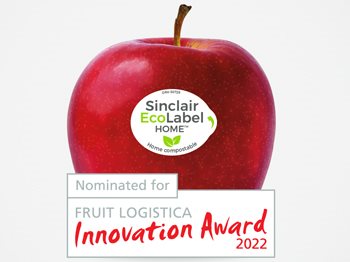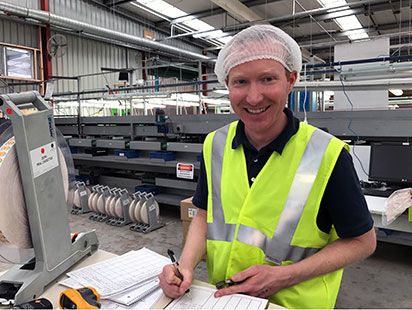A complex recipe:
The home compostable fruit label
 By Duncan Jones, Senior Marketing Manager
By Duncan Jones, Senior Marketing Manager
 Sustainability is part of our everyday lives and this is a good thing. Sinclair, like many companies, is focused on continuous improvement to reduce our impact on the environment. Our goal is to make Sinclair products, services and day-to-day processes increasingly sustainable.
Sustainability is part of our everyday lives and this is a good thing. Sinclair, like many companies, is focused on continuous improvement to reduce our impact on the environment. Our goal is to make Sinclair products, services and day-to-day processes increasingly sustainable.
The launch of the updated Sinclair EcoLabel® in 2019, was a significant step for us and the industry. It was the result of ten years of development and meant, for the first time, we could offer a fully compostable fruit label with an 'OK compostable – Industrial' and 'Seedling' certified construction. But it wasn’t just our success story; we couldn’t have achieved this without close collaboration with our customers and our supply chain partners.
Looking ahead, collaboration is key. We are able to create sustainable business products and practices only by working closely with employees, suppliers, customers, retailers, industry bodies and governments. With more legislative changes and challenges ahead, by working together we can help build a sustainable future.
Sustainability legislation
In many markets, legislation is being formed. In other markets, the conversation has yet to begin. We keep a close eye on legislative developments related to the use of fresh produce labels around the world. Currently the EU and Oceania regions are ahead in their desire for sustainable solutions, but other regions will soon follow due to increasing consumer awareness.
Legislation change in one market can, and will, impact other markets. The most current example of this is the French legislation1 banning fruit and vegetable labels unless they are home compostable, and wholly or partially bio-based. This legislation comes into effect on January 1, 2022. It will affect the labeling of produce in France and fruit and vegetables imported to be sold in France. It’s important to note that this legislation does not impact fruit and vegetables exported from France to other markets, unless of course the destination market has its own legislation affecting fresh produce labeling.
In Belgium, the Government of Flanders has passed legislation2 banning fruit and vegetable labels unless the label is functional, has legally required information or is certified as home compostable.
The situation is fluid and there are many facets to consider. Other markets may follow suit with legislation that, either directly or indirectly, bans the non-compostable fruit stickers. In the US, for instance, proposed legislation was recently was introduced by the Senate3 for review.
The value of fruit labels
In all of this, we should remember that a fruit label is designed as an essential tool for fruit and vegetable produce identification. Each fruit label provides functional data necessary for the supply chain and consumers. A fruit label allows product tracking, retail management and provides consumer product data (origin, variety, etc.), brand differentiation and product trust. A fruit label adds value in a variety of ways for both consumers and retailers. It is also one of the smallest, and most cost-effective, retail communication methods available.
We will remain at the forefront of advocating positive change for a sustainable future for fruit labels. Sinclair is working with industry bodies: PMA, CPMA, IFPS, United Fresh and Freshfel Europe. We recognize our responsibility to be sustainable and also want to ensure that the practical value of labeling to consumers, retailers and growers is understood.
Home compostable fruit label development
 As a leader in our industry since 1982, we constantly develop the science of food-safe fruit labels. Since 2008, we have been working closely with customers in championing the development of a sustainable fruit label. As requirements and technology have evolved, so have our compostable label solutions. There are challenges to overcome, the scarcity of suitable and effective adhesives for home composting products perhaps being the largest.
As a leader in our industry since 1982, we constantly develop the science of food-safe fruit labels. Since 2008, we have been working closely with customers in championing the development of a sustainable fruit label. As requirements and technology have evolved, so have our compostable label solutions. There are challenges to overcome, the scarcity of suitable and effective adhesives for home composting products perhaps being the largest.
Our expectation will always be to provide customers with a high-quality label (and labeling system), with performance as close as possible to our current label range. In reality, this is not immediately possible for a home compostable fruit label. The varying complexities of the packinghouse environment (temperature, humidity, packing line configuration) and the wide variety of fruit skin types, present unique challenges for label conformity and adhesion.
Due to these complexities, it can take up to three to five years to develop, test and certify an effective compostable label construction.
Will Sinclair have a home compostable fruit label by January 1, 2022?
Yes. Sinclair EcoLabel HOME™ is a partially bio-based product that will hold certification against OK compost - HOME from TUV Austria.
We hope to achieve OK compost - HOME certification in a matter of weeks and have commenced Sinclair EcoLabel HOME™ field trials with customers. At this early stage, we expect performance to be lower than our OK compost - Industrial certified Sinclair EcoLabel®. The home compostable fruit label field trials will provide more data to understand label performance as well as development pathways for different fruit and vegetable types.
The next generation of home compostable labels
‘Phase one’ of our development will deliver a home compostable label to meet French legislation in January 2022. In parallel, we are also working on 'Phase two', addressing the challenges in Phase one so performance of compostable labels is akin to that of our current label range. We see ‘Phase two’ as the next generation of home compostable fruit labels.
As I write this, we are moving closer to launching our home compostable label. The deadline for the French legislation is not far away but we’re excited with OK compost certification of Sinclair EcoLabel HOME™ just around the corner.
1 Loi No 2020-105 du février 2020 relative à la lutte contre le gaspillage et à l’économie circulaire. Comes into effect from 1st January 2022.
2 VLAREMA 7, Article 68, para 5.3.14.1
3 Break Free from Plastic Pollution Act 2021
Back to News & Events